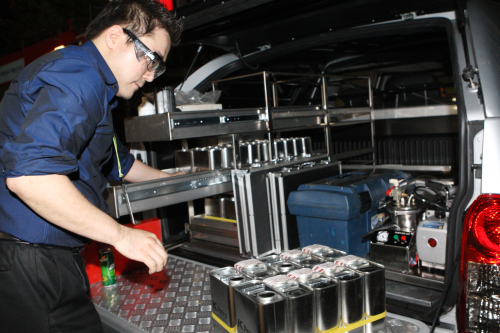
The government and local refiners are joining forces to root out rampant fuel adulteration across Korea by issuing tougher penalties and tipster rewards.
Early this month, the government declared an all-out war against fake fuel, sharply raising fines for gas station owners selling adulterated petrol products and seeking ways to cancel their business licenses once caught.
Hyundai Oilbank Co., the country’s smallest refiner, boosted the drive on Sunday by offering tipsters cash rewards of up to 5 million won ($4,410).
“We’re taking off the gloves to eradicate the sale of adulterated fuel, at least at our 2,400 branches nationwide,” the company said in a statement.
Fake petrol ― made by adding hydrocarbon products such as heating oil, recycled lubricants, toluene or industrial solvents to petrol and diesel ― has troubled policymakers, refiners and drivers as an increasing number of merchants seek to take advantage of cost-conscious drivers in the face of runaway fuel prices.
It hit the headlines in 2002 when a fuel additive known as Cenox sold like hot cakes as rumors swiftly spread that the cheap fuel substitute was eco-friendly, highly fuel efficient and had a rust-cleansing effect. But the manufacturer, Free Flight, was eventually banned from selling it and the firm’s executives were fined and sentenced to jail time in 2004 for tax evasion and illegal sales.
Fake fuels cost about 500 won less because they are not subject to government tax.
However, safety concerns have mounted since explosions at gas stations in September and this month, which claimed four lives, were found to have resulted from tanks of fake fuel. Experts also pointed out that adulterated petrol erodes the performance of engine and components and curtails the life of cars.
“Such incidents have prompted the government to come up with fundamental solutions as they cause anxiety among citizens over the safety at gas stations,” the ministry said, adding that penalties have been too weak to stamp out the problem.
Between this March and June, more than 343 million liters of adulterated petrol were seized and 1,364 people or businesses charged, according to the Ministry of Knowledge Economy.
The ministry said it plans to double the maximum penalty to 100 million won from the present 50 million won.
It unveiled a “one-strike out” system, under which it could immediately deprive any vendor of their business license if they are caught selling unauthorized products.
The ministry added that it will consider revising laws to give ministry officials investigation permits and 100-million-won ground penetrating radar to hunt for hidden underground tanks containing adulterated petrol at gas stations.
By Shin Hyon-hee (heeshin@heraldcorp.com)
-
Articles by Korea Herald










![[Today’s K-pop] BTS pop-up event to come to Seoul](http://res.heraldm.com/phpwas/restmb_idxmake.php?idx=644&simg=/content/image/2024/04/17/20240417050734_0.jpg&u=)
![[Graphic News] More Koreans say they plan long-distance trips this year](http://res.heraldm.com/phpwas/restmb_idxmake.php?idx=644&simg=/content/image/2024/04/17/20240417050828_0.gif&u=)





![[KH Explains] Hyundai's full hybrid edge to pay off amid slow transition to pure EVs](http://res.heraldm.com/phpwas/restmb_idxmake.php?idx=652&simg=/content/image/2024/04/18/20240418050645_0.jpg&u=20240419100350)

